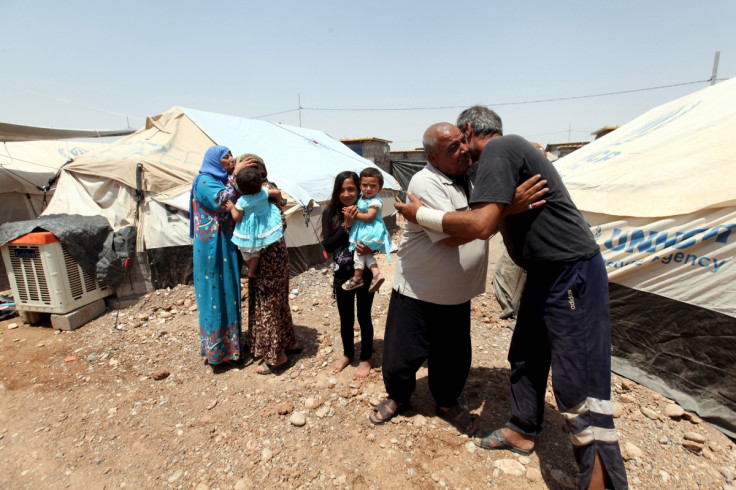Refugee crisis country aid contributions: Russia and China in 'bad list' amid UN funding shortfall

UN officials have lamented a massive shortfall in funding for humanitarian response plans across the globe. Antonio Guterres, the UN High Commissioner for Refugees, said a reason hundreds of thousands of people were embarking on dangerous journeys to Europe was because aid agencies were unable to provide adequate assistance due to a lack of money.
Syrians and Iraqis, who together make up 58% of the more than 750,000 asylum-seekers who have reached European shores in 2015, have been particularly affected by the budget deficit.
By 5 November, world nations have given a total of $4.4bn (£2.8bn, €4bn) to help Syrians within their and neighbouring countries, $700m less than the total collected in 2014, according to the UN financial tracking service. The response plan for Iraq instead is currently only 59% funded, with $710m collected against the total of $1.1bn raised in 2014.
The shortfall has resulted in painful cuts and Guterres said many felt "the international community was starting to abandon them" when the UN World Food Programme was forced to slash its assistance by 30%.
As aid agencies appeal for more money to face the approaching winter months, IBTimes UK takes a look at single countries contributions to see what governments gave.
And the world largest aid provider is...
The US is steadily the world largest aid provider, with more than $5bn in overall contributions to the UN-managed humanitarian system in 2015. Washington leads the table also for the Syria and Iraq response plans, with offers of respectively $1.2bn and $135m.
However, with less than two months to the end of the year, payments have been significantly lower than in 2014, when a total of $7.9bn was given, of which $1.7bn went to Syria.
If in general terms the US is the most generous country, it is not so if donations are compared to the size of economy. In 2015 in fact, it has committed the 0.029% of its gross domestic product (GDP).
In the same period Norway, for example, has proven to be more open-hearted, committing 0.092% of its GDP, with $388m donated, including $114m to Syria.
The US is nevertheless still far from the bottom of the generosity table. China, the world's second largest economy, has so far handed the UN a meagre $23m (0.0002% of GDP). It also cut off completely aid to Syria, which stood at $4.9m in 2014. Beijing has given most of its 2015 aid to help the victims of the earthquake in Nepal.
Little Estonia and Trinidad and Tobago gave relatively more, committing 0.0080% ($2m) and 0.0010% ($250,000) of their GDP.
Similarly, Russia has committed only 0.0013% of its GDP, giving $15m, of which $6.7m to help Syrians displaced by a war Moscow is now contributing to, launching air strikes against opponents of the Assad regime.
Britain is the third largest overall contributor, after the European Commission, with $1.37bn (0.049% of GDP). In 2015, it has almost doubled its aid to Syria to $631m, while funds to Iraq decreased from $71m in 2014 to $28m.
France, in comparison, has devolved only $51m overall (0.002% of GDP), including $12m to Syria through the UN system. In 2014 it had given more than four times that, with $210m in total contributions and $46m to Syria.
Germany and Japan feature high up on the table for total donations ($734m, $742m), as well as donations for Syria and Iraq, but overall have committed a lesser to share of their wealth than the UK (0.022%, 0.018%).
Saudi Arabia and the UAE have proven to be benevolent donors with $460m and $311m respectively (0.07% and 0.085 of GDP). However, Gulf States are known to be often erratic in their offers, which reflect issues of domestic and foreign policy.
In 2014, Riyadh gave a one-off total of $500m for the Iraqi emergency, while not a single dollar has gone to that appeal in 2015. Similarly, its funding for Syria has gone down from $213m in 2013 to only $18m this year, when most of its resources ($412m) have been devolved to help Yemenis caught in a conflict Saudi Arabia is an active part in.
UAE's offerings have also followed a similar pattern. In 2014, $275m out of a total of $361m went to aid Syrians, whereas in 2015 most of the budget ($230) was shifted to Yemen.
Finally a large number of countries including Israel, Uzbekistan, Lebanon and North Korea have not given any aid to the UN in 2015. For political reasons, governments that have a troubled relationship with the UN, often prefer to give aid directly to aid agencies and NGOs. These amounts do not appear in the UN Financial Tracking Service, which has been used to find the figures for this article.
© Copyright IBTimes 2025. All rights reserved.






















